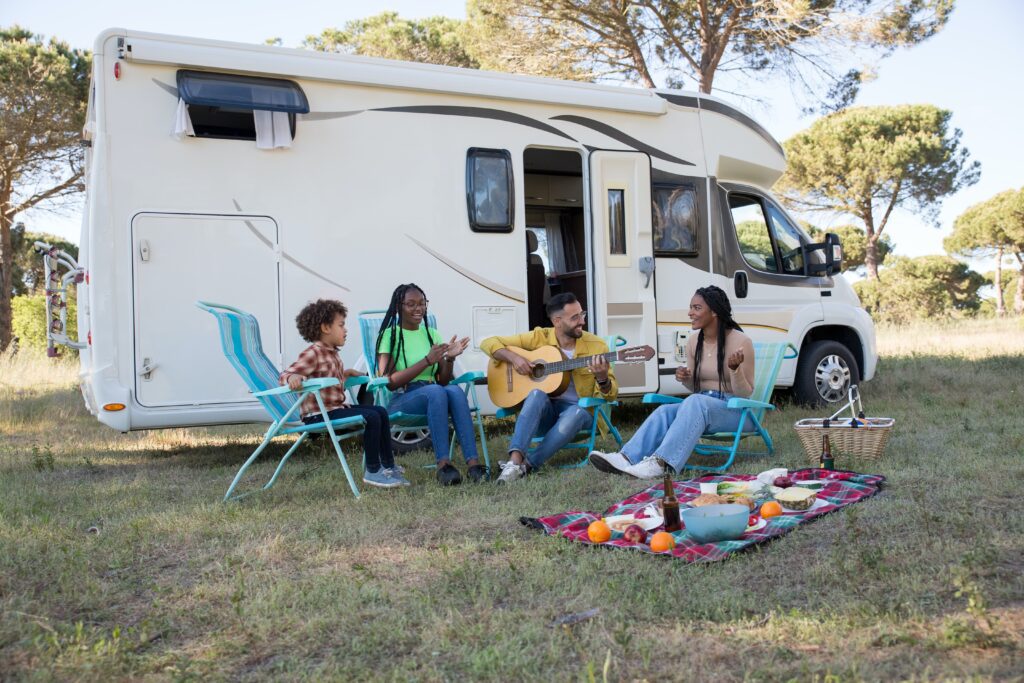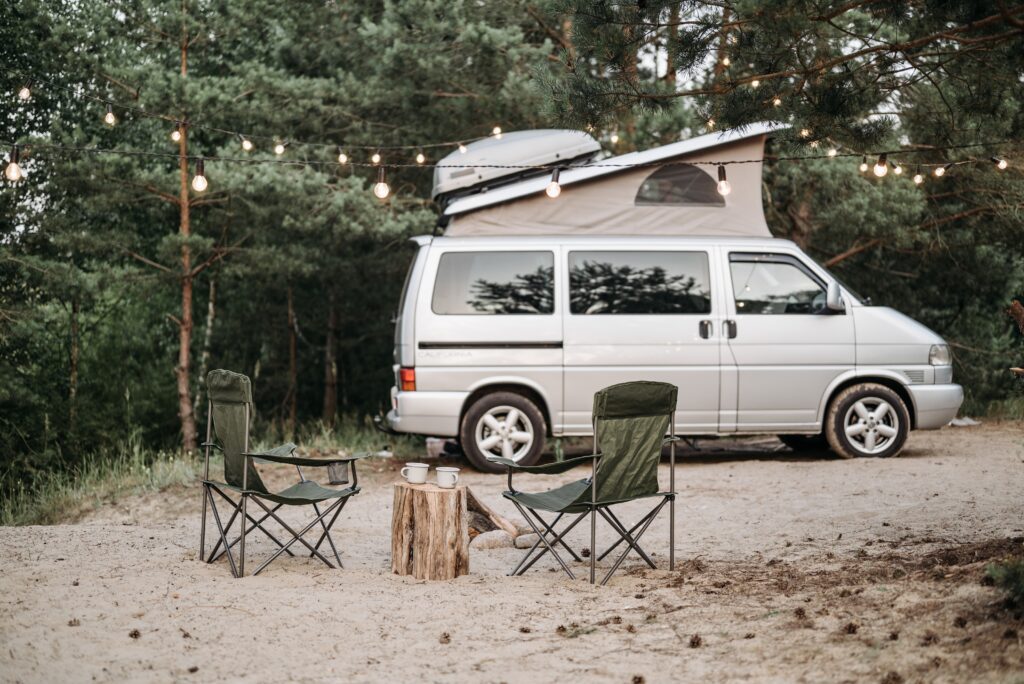Are you considering getting an RV for family travel but don’t know where to start looking? We have you covered! This article will discuss the different types of RVs and personal considerations for picking the perfect one for your family.
What is an RV?
Ok, let’s start at the beginning. What is a Recreational Vehicle (RV), and how is that different from a trailer or even a 5th Wheel? Many people use most of the terms synonymously. RV is an all-encompassing term to include Motorhomes, Travel Trailers, and 5th Wheels.
FEMA defines an RV as “a vehicle that is:
- Built on a single chassis;
- 400 square feet or less when measured at the largest horizontal projection;
- Designed to be self-propelled or permanently towable by a light-duty truck; and
- Designed primarily not for use as a permanent dwelling but as temporary living quarters for recreational, camping, travel, or seasonal use.”
We like to explain it a bit more basically: An RV is a trailer or vehicle that allows you to eat, sleep, and use the bathroom. While most of them offer each of these amenities, not all of those amenities are created equally, as you will soon see below.
Now that we have that straight let’s jump into each type of RV.
Types of RVs


Motorhome
A motorhome is a drivable RV.
Motorhomes can be confusing because they have different categories called classes. There are three main types of classes of motorhomes: Class A, Class B, and Class C.
Class A motorhomes are the ones that we traditionally think look like busses (some of them actually are!). These motorhomes are fully integrated into their chassis. This integration allows them to have large front windows and more square footage. They were traditionally considered more luxurious than the other motorhome classes, but now you can find luxury in any class.
Class B motorhomes are fancy vans. These vans have minimal square footage, so they are designed with great detail to ensure they can fit all the amenities that anyone would ever want.
Class C motorhomes look more like a box designed onto the back of a truck. As far as size goes, they are between Class B (smallest) and Class A (largest). The exception would be the “Super C,” a massive Class C on an even larger truck. All three of these classes of motorhomes can come as basic or as luxurious as you want. We have seen Class A motorhomes with stone floors and chandeliers, but we have also seen ones designed more for young families. Depending on your budget, a motorhome can be an excellent option for a family that doesn’t already have a truck or large SUV that can tow a trailer.


Travel Trailers
Travel trailers are great options for those new to RVing. They come in all shapes and sizes and can meet just about any need you may have for your family. A travel trailer is a tow-behind RV. There are many different kinds of travel trailers, from pop-ups to toy haulers. This is a very versatile category of RV.
The main problem we see on the road and in the campgrounds with this category is that some people aren’t good at towing. Admittedly, people aren’t born good at pulling a trailer; it takes practice and skill. Only you will know if you and any other drivers you are traveling with can tow a trailer, but this and your vehicle size will probably be your limiting factors.
5th Wheels
5th Wheels or Goose Necks are trailers that connect to the truck via a hitch in the middle of the truck bed. These trailers are more accessible to tow and maneuver when backing up than a travel trailer.
Questions to ask yourself
A lot of picking the perfect RV for your family travel comes down to your family’s specific needs. As our family has grown and changed over the years, the type of RV, we owned or desired changed. Most RV dealerships will tell you that after the first couple of years, people will either sell their RV because they aren’t using it or trade it in because they need something different. We think that you can improve your odds of not being one of these cases by being honest with yourself about a few questions.
- How much room do you really need?
- How often will you honestly be able to use your RV?
- What kinds of places do you want to visit?
- Do you currently have the means to tow an RV?
Let’s look at each of those questions and why they play a part in your decision.
How much room do you really need?
A lot of factors go into this question. When we bought our 24ft Class C motorhome, we had three young children and a large dog. While 24ft may sound like a lot, it isn’t in a Class C with that many occupants! Even though there wasn’t much room, that wasn’t a big deal for us. We mainly used our RV for travel and shelter. When we got to our locations, we wanted to spend our time outside or exploring different places. A small Class C gave us this freedom. In the 2+ years that we owned the Class C, we traveled to around 24 states and allowed the kids to experience things a whole new way.
When you think about this question, think about the size/age of your family, how you plan to use the RV, and how claustrophobic you might get on those rainy days that you can’t go outside.
How often will you honestly be able to use your RV?
This is one of the questions that tend to trip people up. They purchase a new RV with dreams of taking it out every weekend, but the real world gets in the way. Eventually, they realize that they are not only paying for the loan and insurance on an RV they aren’t using as much as they wanted, but they are also paying for the storage. These costs can add up.
Be honest with yourself, if you can only use the RV for the trips you take now, would that make the cost worth it? If not, maybe you should look for a way to reduce the cost (cheaper RV or store in the driveway) or perhaps just rent an RV for a particular vacation.
What kinds of places do you want to visit?
Some trips aren’t practical for certain types of RVs. If you travel to major destinations, there will often be parking for buses or RVs. This will make your life a lot easier, and you can find this information fairly quickly with a phone call or google search. For destinations that don’t offer parking for larger RVs, life can be challenging if you choose to go with a larger RV. There are also camping resorts that only accept certain types of RVs. The most common of these is for the Class A motorhome crowd. These examples are limited but could play into your decision and should be considered.
Do you currently have the means to tow an RV?
One of my favorite sayings from my dad is, “lots of trucks can tow the trailer; just make sure you get one that can stop it too!” Towing a trailer that is too much for your vehicle can cause damage to the car or truck and create an unsafe driving condition for your family and those around you. In most cases, it is better to have a vehicle more than capable of towing the trailer. When in doubt, ask an expert, and don’t just rely on the person trying to sell you the RV.
If you don’t have a vehicle capable of towing the type of RV you want, you will need to account for the amount of money you will need to spend on a bigger vehicle or consider going the motorhome route. Many people don’t want to get a motorhome because of the cost, but we found that when you think about the price of a new truck on top of the trailer, a motorhome can be a less expensive option.


Conclusion
As we wrap up this already reasonably long article, we want you to remember a couple of major themes from this article. One point you read throughout was that each family is different, and you need to consider which RV is perfect for your family. The other central theme is that cost plays a big part in purchasing an RV. Don’t forget all the extra costs like insurance, storage, campground fees, fuel, etc. Some of these additional costs occur whether you use the RV or not. These themes aren’t to scare you but to provide you with data points on what is ultimately a big decision for most families.
The purpose of this RV is to bring your family closer as you travel. We thoroughly enjoyed our RV travels, and it is something that our older children still talk about to this day. If you choose to get an RV, we hope your family enjoys it as much as ours.
Leave us a comment if you found this article helpful, and we will create more RV-themed content and more about how to pick the perfect RV for your family vacation. In the meantime, check out our article 5 Best Podcasts to enjoy in the car with kids.

